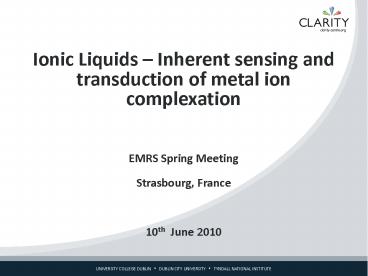Ionic Liquids - PowerPoint PPT Presentation
Title:
Ionic Liquids
Description:
Ionic Liquids Inherent sensing and transduction of metal ion complexation EMRS Spring Meeting ... Ionic Liquid Copper Mix Cobalt PVC: IL (1:2) ... – PowerPoint PPT presentation
Number of Views:1134
Avg rating:3.0/5.0
Title: Ionic Liquids
1
- Ionic Liquids Inherent sensing and transduction
of metal ion complexation - EMRS Spring Meeting
- Strasbourg, France
- 10th June 2010
2
Me..
- Graduated with B.Sc (Hons) in Chemical
Pharmaceutical Sciences, Dublin City University
(2008). - PhD. in Ionic Liquids and their use in the
development of potential chemical sensors. Sept
08 - Supervisors Dr. Aleksandar Radu Prof. Dermot
Diamond
3
Outline
- Ionic Liquids
- Polymeric Optodes
- Ionic Liquid PVC Optodes
- UV/Vis Characterisation
- Alternate Detection Techniques
- Wireless Radio Frequency Detection
- Electrochemical Impedance Spectroscopy
- Portable X-Ray Fluorescence
4
Ionic Liquids
- Unique combination of
- ions that are liquid at room
- temperature
- Choice of ion pair can have
- dramatic impact on
- Density
- Viscosity
- Miscibility with Solvents
5
Applications
- Synthesis Catalysis in Organic Chemistry
- gt Good thermal stability
- Electrochemistry
- gt Good Conductivity and a large electrochemical
window - Analytical Chemistry
- gt Stable stationary phase for separations
6
Polymeric Optodes
- Typically contain up to 5 components
- Polymer Inert matrix to house active sensing
components - Plasticizer Lowers Tg of polymer to produce
solid film - Ion-Exchanger Facilitates Ion Transfer from aq.
to organic phase - Ionophore Selectively binds ion of interest
- Transducer Dye Produces optical response
PMMA optodes containing Spiropyran dye
3. A. Radu, R. Byrne, N. Alhashimy and D.
Diamond, Abstr. Pap. Am. Chem. Soc., 2006, 231,
41-INOR.
7
Simple, 2-component optodes
Co2
Cu2
- P6,6,6,14DCA acts as
- plasticizer
- ion-exchanger
- ligand
- transducer dye
- Upon exposure to Cu2 and Co2
Cu2/Co2
8
Multianalyte Recognition
9
Binding Constants
- Best fit was found to be 2M for 1L
10
Dicyanamide
- Pseudohalide, shown in literature to bind to an
array of TM elements1 - Due to strong electron delocalisation across
molecule, resulting in a variety of binding
modes2 - Rich binding diversity results in many 1,2 and
3-D co-ordinated networks reported - Used to impart low viscosity in a new generation
of Ionic Liquids
M
1. S. R. Batten, P. Jensen, B. Moubaraki, K. S.
Murray and R. Robson, Chem. Commun., 1998,
439-440. 2. S. R. Batten and K. S. Murray,
Coordination Chemistry Reviews, 2003, 246,
103-130.
DCA
11
Interference Spectra
- Ni2 has been shown to bind to DCA4, yet
produces no optical response
4. J. Kohout, L. Jager, M. Hvastijova and J.
Kozisek, J. Coord. Chem., 2000, 51, 169-218.
12
RF Wireless Conductivity Detection
- In conjunction with CSIRO Laboratories,
- Melbourne, Australia
- Works by passing low voltage, low
- frequency AC signal from transmitting
- to receiving electrodes
- Sample is housed in an insulating
- container
- Conductive sample produces a signal
- as it passes through the electrode
- field
13
RF Wireless Conductivity Detection
- Depending on pH, polyaniline (PAni) can switch
between conductive and non-conductive forms - Ink-jet printed Pani dispersion
- Strip housed in insulating container
- Response occured upon repeated
- exposure to acetic acid and ammonia
N. B. Clark and L. J. Maher, Reactive
Functional Polymers, 2009, 69, 594-600.
14
Conductive Membranes
- WRF has the required sensitivity
- to distinguish between complexed
- and non-complexed membranes
- Edge effects occur as insulating
- material first enters and leaves
- electrode channel
15
Screen Printed Electrodes
- Ag/AgCl ink used as conducting path
- Carbon Paste used as working electrode
- Insulating Layer defines the working area
- Conducting polymer (Poly (3-octylthiophene))
- is first dropcast to aid ionic to electronic
- Transition
- PVC-IL cocktail dropcast and allowed to dry
A. Morrin, A. J. Killard and M. R. Smyth,
Analytical Letters, 2003, 36, 2021-2039.
16
Impedance Spectroscopy
- PVCIL 12 (w/w)
- PVCIL (11 w/w)
17
Portable X-Ray Fluorescence
- Emitting x-rays knocks out electron in inner
shell - Vacancy is filled by atom from outer shell
- Filling of vacancy emits frequency
- XRF picks up frequency characteristic of element
18
XRF Results
- Used to quantify DCA-
- binding preferentiality
- Co levels were found
- to be 45 lower
- Even as a mixture
- (21 CoCu (vol.))
- Co levels are 88 lower!
19
Conclusions
- The Ionic Liquids P6,6,6,14DCA fulfils
multiple roles in polymeric optodes - Conductive membranes allow for detection via an
array of techniques - The relative ease of synthesis and diversity
allows for the possibility of new ILs with
greater selectivity
20
Acknowledgements
- Drs. Aleksandar Radu, Robert Byrne and Professor
Dermot Diamond - Michele Zanoni, Bartosz Ziolkowski, Larisa Florea
and Caroline Barry - Drs. Noel Clarke and Matthius Hilder at CSIRO
- Cytec Industries
- DCU Research Career Start Fellowship 2008
- Science Foundation Ireland (grant 07/CE/I1147)
- Enterprise Ireland (grant 07/RFP/MASF812)
21
- Thanks for listening!































